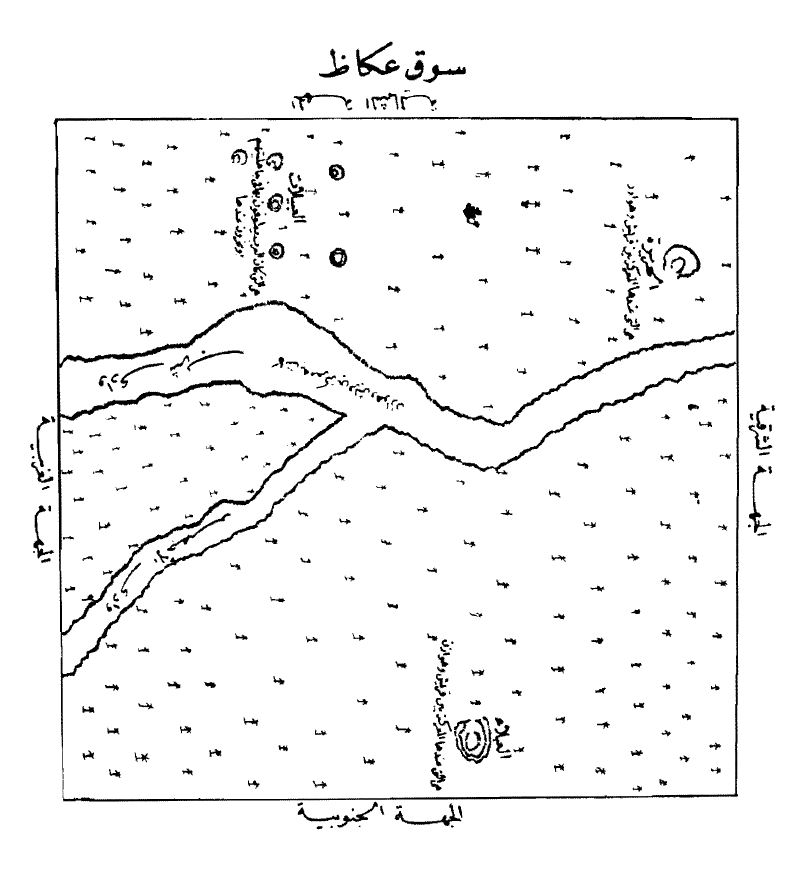Souk Okaz on:
[Wikipedia]
[Google]
[Amazon]
 Sūq ʿUkāẓ ( ar, سوق عكاظ) is a
Sūq ʿUkāẓ ( ar, سوق عكاظ) is a
Souq Okadh website
{{dead link, date=July 2022
Saudi Arabia Museums websiteSaudi Rock Art Heritage website
Pre-Islamic Arabia Souqs Tourist attractions in Saudi Arabia Annual events in Saudi Arabia
marketplace
A marketplace or market place is a location where people regularly gather for the purchase and sale of provisions, livestock, and other goods. In different parts of the world, a marketplace may be described as a '' souk'' (from the Arabic), ' ...
at ʿUkāẓ, between Nakhla and al-Ṭāʾif, in Saudi Arabia
Saudi Arabia, officially the Kingdom of Saudi Arabia (KSA), is a country in Western Asia. It covers the bulk of the Arabian Peninsula, and has a land area of about , making it the fifth-largest country in Asia, the second-largest in the A ...
. It was the largest and best known souq in pre-Islamic times. Today it is a popular tourist destination.
History
Sūq ʿUkāẓ was a seasonal market which operated for two weeks each year during the month ofDhu al-Qi'dah
Dhu al-Qa'dah ( ar, ذُو ٱلْقَعْدَة, ', ), also spelled Dhu al-Qi'dah or Zu al-Qa'dah, is the eleventh month in the Islamic calendar.
It could possibly mean "possessor or owner of the sitting and seating place" - the space occupied w ...
. It competed with the fairs of Majanna and Dhu ’l-Majaz̄, which were also held near Mecca at the same time of year.Irfan Shahîd, 'ʿUkāẓ', in ''Encyclopaedia of Islam, Second Edition'', ed. by P. Bearman and others (Leiden: Brill, 1960-2005), , . It was active from approximately 542-726 CE. Strategically located at a central point on the Spice Route through Western Arabia, its growth in the sixth century was partly caused by the Byzantine-Persian wars, which made it harder for Mediterranean markets to access Mesopotamian trade-routes. ʿUkāẓ lay in the territory of the Hawāzin tribal group, and its functions were controlled particularly by the Tamīm.
The gathering was facilitated by the sanctity of the sacred months during which it was held and its proximity to the holy plain of ʿArafāt. Although primarily for commerce, the market of ʿUkāẓ was an important center where Arab
The Arabs (singular: Arab; singular ar, عَرَبِيٌّ, DIN 31635: , , plural ar, عَرَب, DIN 31635: , Arabic pronunciation: ), also known as the Arab people, are an ethnic group mainly inhabiting the Arab world in Western Asia, ...
s would meet to formalize tribal rules, settle disputes, pass judgments, make agreements, announce treaties and truces, hold sporting competitions and races, poetry
Poetry (derived from the Greek ''poiesis'', "making"), also called verse, is a form of literature that uses aesthetic and often rhythmic qualities of language − such as phonaesthetics, sound symbolism, and metre − to evoke meanings i ...
competitions, and religious gatherings; it has been compared in this respect to the ancient Greek institution of the panegyris. It was especially important for poetry competitions, which served to formalize rules of Arabic language
Arabic (, ' ; , ' or ) is a Semitic language spoken primarily across the Arab world.Semitic languages: an international handbook / edited by Stefan Weninger; in collaboration with Geoffrey Khan, Michael P. Streck, Janet C. E.Watson; Walte ...
verse, grammar and syntax.
The site and its sacrality was significant in the Fijār War of the late sixth century CE (between the Qays-ʿAylān, including the Hawāzin, on the one hand and the Quraysh and Kināna tribes on the other). The war was precipitated by the murder of ʿUrwa al-Raḥḥāl of the Banū ʿĀmir ibn Ṣaʿṣaʿa by al-Barrāḍ ibn Qays al-Ḍmıī Kinānī while ʿUrwa was escorting a Lakhmid caravan from al-Ḥīra to ʿUkāẓ during the holy season. This was considered sacrilegious by the pagan Arabs, hence the war's name, ''ḥarb al-fijār'' ('the war of sacrilege'). The site of the market gave its name to a battle in the fourth and final year of the war, ''yawm ʿUkāẓ'' ('the day of ʿUkāẓ', also known as ''yawm Sharab'').
The site is prominent in later legends of pre-Islamic Arabian heroes: it allegedly saw preaching visits from the Islamic prophet, Muḥammad
Muhammad ( ar, مُحَمَّد; 570 – 8 June 632 CE) was an Arab religious, social, and political leader and the founder of Islam. According to Islamic doctrine, he was a prophet divinely inspired to preach and confirm the monoth ...
and the semi-legendary Christian Quss ibn Sāʿida, and is the scene of some stories about Hind bint al-Khuss.Ch. Pellat, 'Hind Bint al-Khuss', in ''Encyclopaedia of Islam'', ed. by P. Bearman and others, 2nd edn (Leiden: Brill, 1954–2005), , . Yet the importance of ʿUkāẓ declined after the rise of Islam, because the increasingly sprawling caliphate facilitated new trade-routes, and altered the social roles of Arabian tribes. The market was definitively destroyed by the Khārijites in 127 AH (725-26 CE), who sacked it.
The location of Sūq ʿUkāẓ was disputed until historian Muhammad bin Abdallah al-Blahad rediscovered it. A major study was published in 1960 by Saʿīd al-Afghānī.
Modern Souq
A modern souq has been recreated at the location of the historic souq. Each year's souq honors a different poet. The souq covers 14 million square meters of land. In modern times, as in the past, there are lectures, sporting competitions, poetry, artwork, and items for sale. The souq has 200 shops selling different goods including pottery, silverware, glassware, wall arts and historical manuscripts.See also
*Tourism in Saudi Arabia
Saudi Arabia is the second biggest tourist destination in the Middle East with over 16 million visiting in 2017. Although most tourism in Saudi Arabia still largely involves religious pilgrimages, there is growth in the leisure tourism sector. ...
References
External links
Souq Okadh website
{{dead link, date=July 2022
Saudi Arabia Museums website
Pre-Islamic Arabia Souqs Tourist attractions in Saudi Arabia Annual events in Saudi Arabia